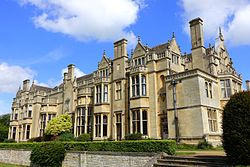Rushton Hall
| Rushton Hall | |
| Northamptonshire | |
|---|---|

| |
| Location | |
| Grid reference: | SP83628278 |
| Location: | 52°26’12"N, -0°46’17"W |
| Village: | Rushton |
| History | |
| Information | |
| Condition: | converted to a hotel |
Rushton Hall is a stately home in Rushton, in Northamptonshire. It was the ancestral home of the Tresham family from 1438, when William Tresham, a veteran of the Battle of Agincourt and Chancellor of the Duchy of Lancaster bought the estate. In the 20th century the house became a private school and it has now been converted to a luxury hotel.
The estate is about 227 acres, of which 30 acres are formal gardens. The River Ise flows from west to east south of the Hall.
The house is a Grade I listed building.[1]

History
Rushton Hall had been the possession of the Roman Catholic Tresham family since the fifteenth century, when William Tresham bought the estate in 1438. He was Attorney General to King Henry V, Chancellor of the Duchy of Lancaster and Speaker of the House of Commons,[2] and was murdered in 1450.
William's son Thomas Tresham, served as Sheriff of Cambridgeshire and Huntingdonshire, Sheriff of Sussex]], Sheriff of Surrey]] and later Speaker of the House of Commons. He was involved in the plots of John de Vere, 13th Earl of Oxford, principal commander of Henry VII of England's army at the Battle of Bosworth Field of the Wars of the Roses. Descendants also served in Parliament and as sheriffs at various times. A later Thomas Tresham (1534-1605), also a Sheriff of Northamptonshire in 1573, built the Triangular Lodge in the grounds of the hall in 1592. He was brother-in-law through his wife, Muriel Throckmorton, daughter of Robert Throckmorton, Constable of Warwick Castle, to Edward Arden, a second cousin of Mary Shakespeare, the mother of William Shakespeare. The Throckmortons were known for their participation in the Rebellion of Thomas Wyatt of 1554 and later on, in the Throckmorton Plot of 1583. Their son, Francis Tresham, was cousin-in-law of the famous Sir Walter Raleigh through his cousin Elizabeth Throckmorton, and was involved in the Gunpowder Plot: he died in the Tower of London in 1605. The estate then passed to his brother Lewis.

The Hall was sold in 1619 to Sir William Cockayne, Lord Mayor of London who was the first Governor of Londonderry.[2] and on his death in 1626 passed to his eldest son Charles, later Viscount Cullen, who was appointed Sheriff of Northamptonshire for 1636–37.
In 1828 the Hall was sold to the family of Thomas Hope (1769–1831), owners of the Hope & Co. Bank: the Hopes were a famous Dutch banking Dynasty, rivals of the Rothschild family, and among the richest families in Europe. In 1854 the estate was sold to Clara Thornhill (later Clarke-Thornhill). Charles Dickens was a great friend of Clara and visited Rushton several times. The fictitious Haversham Hall in Great Expectations was conceived from the Hall. The Clarke-Thornhills owned the hall until 1934. After the death of William Clarke-Thornhill, the Hall was let to an array of tenants.
In 1957 the house became a school for blind children run by the Royal National Institute of Blind People.
The Hazelton family bought the hall in August 2003,[3] and restored it to open as a 4 star hotel and spa.
Estate
The estate has early 20th century formal terraced gardens designed by Thomas Mawson between 1905 and 1909. The rest of the estate has separate ownership to the hotel with features dating back to the 16th century and before. The 16th-century Triangular Lodge in the former parkland is owned by English Heritage and is open to the public.
Outside links
| ("Wikimedia Commons" has material about Rushton Hall) |
- Rushton Hall Hotel, Conference and Wedding Venue, Spa and Restaurant
- Parks and Gardens UK
- BBC News item in 2002 about the sale of Rushton Hall
References
- ↑ National Heritage List 1192160: Rushton Hall School (Grade I listing)
- ↑ Jump up to: 2.0 2.1 Nikolaus Pevsner: The Buildings of England: Northamptonshire, 1961; 1973 Penguin Books ISBN 978-0-300-09632-3page 397
- ↑ "Blog - Rushton Hall". http://www.rushtonhall.com/news/celebrating-10-years-of-business.